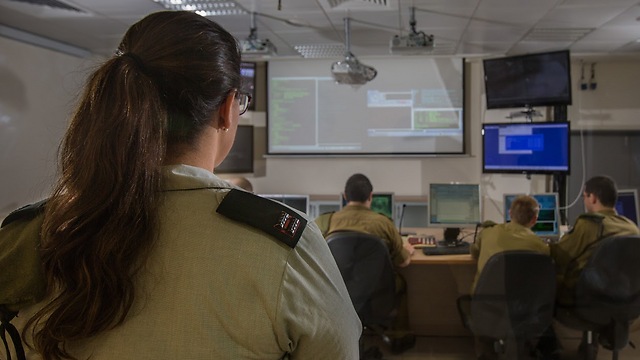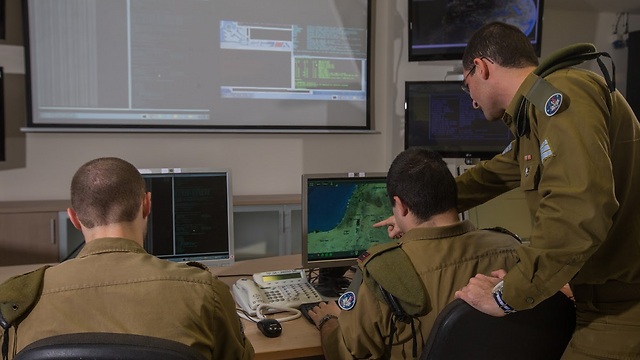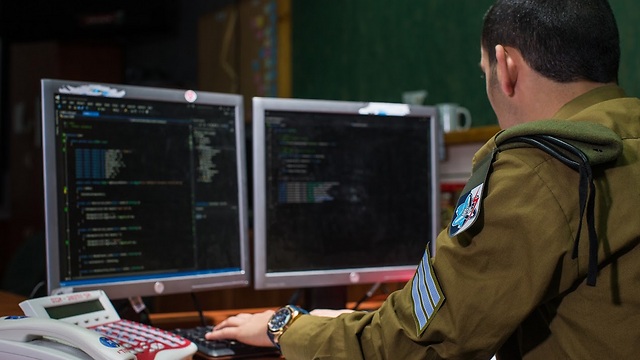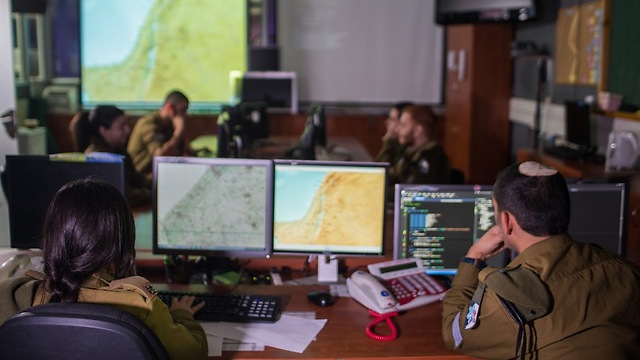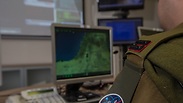
IDF training to defend against cyber attacks on vital infrastructure
The cyber security division of the IDF is starting to take shape, with eight units involved; their mission is to defend against cyber attacks on essential Israeli infrastructure.
IDF Chief of Staff Gadi Eisenkot's decision to establish a cyber division by to was described as "more important than the merger of the Technology-Logistics Directorate with the ground forces, or the establishment of the 'Commando Brigades'" by a high-ranking IDF officer.
According to him, the division is already starting to take shape in the form of eight special cyber units whose responsibilities will be to defend against cyberattacks on vital Israeli infrastructure such as water, electricity, banking, cellular networks, and more.
The officer pointed to large cyberattacks which carried out in the past three months to show a major attack is not all that far-fetched.
The first of these attacks was the collapse of the internet in Turkey for 20 hours, which came on top of a three-month attack on Turkish banks.
The second example was the collapse of a third of Ukraine's electrical grid for a period of three weeks last Christmas, and the fact that the main airport in Kiev was shut down for two days due to a massive cyber attack. The officer added that the five most important countries in the field in regards to cyber technology are the US, Iran, Germany, Britain, and Israel.
"There are no coincidences in life -- cyber attacks have turned into a legitimate weapon of war," said the officer. He added that "these attacks occurred after a relatively quiet year in cybersecurity, on the heels of the nuclear agreement with Iran. We have established these mixed IDF units, which will multiply and grow over the coming years, so that if we have a 'cybernetic September 11', we won't have to ask questions. We are more bothered by the cyber threats to our national infrastructure than we are on attacks on the army. What happens if Ben Gurion International Airport is shut down, or if we lose internet access?"
Regarding these scenarios, the IDF has two principal assessments regarding a cyber attack on Israel -- at least until the middle of this year. The first suggests a low likelihood of offensive actions -- such as malware which is implanted into a system and acts after receiving a certain command -- into IDF systems.
The second touches upon increase global efforts to collect intelligence on Israel through cyber means on, amongst other things, critical war plans such as the "trophy", a device which shoots incoming anti-tank missiles out of the air. The officer also revealed that up to now, there has been no evidence of break-ins to any IDF operational systems.
The Telecommunications Directorate of the IDF highlighted that an attack on an IDF website is not a significant cyber attacks, but is still important. For example, after the assassination of Hezbollah operative Samir Kuntar, which was attributed to Israel, Lebanese hackers infiltrated the Israel Air Force website and shut it down for a short period of time. The IDF websites are on regular civilian internet, but the operational websites are on an internal network, which is completely separated from the civilian system.
"Our systems defense also includes defense of the Home Front Command website," said the officer. "In an emergency, the public needs to be able to receive information from us, and to operate according to our guidelines."
The officer further revealed that the IDF canceled the project by the Home Front Command to send text messages to Israelis in danger areas. This project has already cost Israel tens of millions of shekels, but stalled because of lack of cooperation by cell phone manufacturers.
"We stopped the project because we decided that it is better for civilians to have a warning system such as an air raid siren, which everyone understands and is completely reliable, rather than another type of warning system which is only about 80 percent reliable," he said.
"It enraged usus that Hamas and Islamic Jihad shot over half of their rockets supply (without first being destroyed by the IDF)," said the officer. "In the Third Lebanon War there will be 70,000 rockets, so we developed a system which will enable commanders on the ground to more effectively adjust their fire. Our monitoring capability during Protective Edge were not good enough at identifying sources of fire were from the Strip in real time."
On top of this, after a quarter century in which the air force, navy, intelligence, and land forces all independently developed their own telecommunications and internal networks, the Telecommunications Directorate finally plans to merge all of these systems into one unified internet, which will streamline operational processes. For instance, the new fighting command center will have two or three screens, as opposed to the 12 that are being used today.
The Telecommunications Directorate is also expected to strengthen the electronic warfare systems intended to disrupt the communications systems of the enemy without them being able to affect the communications systems of the IDF.










